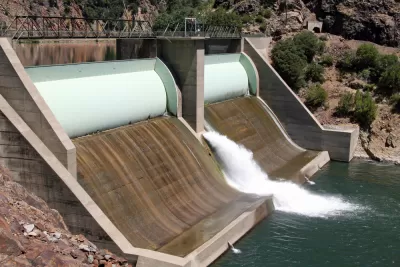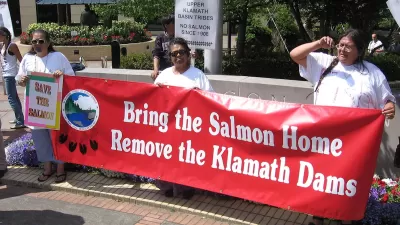Where aging infrastructure is concerned, most of us don't immediately think of old dams. But there are a lot of them. Environmental advocates want to see them go, and in recent years de-damming has picked up speed.

While hydroelectric power remains a significant source of renewable energy, thousands of dams across the country are becoming obsolete. Advocates argue that restoring key rivers is worth the cost of decommissioning old dams. Daniel J. McGraw writes, "Dams prevent waterways from cleaning themselves. When they are removed, the natural filtering process can work its magic."
"Since 1912, about 1,300 dams have been removed in the U.S. But in the last 10 years, the pace of de-damming has sped up considerably with nearly half of the removals happening since 2006." According to the American Society of Civil Engineers, 14,000 dams across the U.S. are high-hazard, "meaning there will be loss of life and significant economic loss downstream if they fail."
McGraw's piece focuses on Ohio's Cuyahoga River, which infamously caught fire in the late 1960s and prompted the creation of the U.S. Environmental Protection Agency. De-damming that river has bipartisan support, but finding the funds can be difficult, especially as the Trump administration proposes massive cuts to the EPA.
FULL STORY: America’s Great Dam Teardown Means Cleaner Water, More Parkland

Planetizen Federal Action Tracker
A weekly monitor of how Trump’s orders and actions are impacting planners and planning in America.

Maui's Vacation Rental Debate Turns Ugly
Verbal attacks, misinformation campaigns and fistfights plague a high-stakes debate to convert thousands of vacation rentals into long-term housing.

Restaurant Patios Were a Pandemic Win — Why Were They so Hard to Keep?
Social distancing requirements and changes in travel patterns prompted cities to pilot new uses for street and sidewalk space. Then it got complicated.

In California Battle of Housing vs. Environment, Housing Just Won
A new state law significantly limits the power of CEQA, an environmental review law that served as a powerful tool for blocking new development.

Boulder Eliminates Parking Minimums Citywide
Officials estimate the cost of building a single underground parking space at up to $100,000.

Orange County, Florida Adopts Largest US “Sprawl Repair” Code
The ‘Orange Code’ seeks to rectify decades of sprawl-inducing, car-oriented development.
Urban Design for Planners 1: Software Tools
This six-course series explores essential urban design concepts using open source software and equips planners with the tools they need to participate fully in the urban design process.
Planning for Universal Design
Learn the tools for implementing Universal Design in planning regulations.
Heyer Gruel & Associates PA
JM Goldson LLC
Custer County Colorado
City of Camden Redevelopment Agency
City of Astoria
Transportation Research & Education Center (TREC) at Portland State University
Jefferson Parish Government
Camden Redevelopment Agency
City of Claremont





























